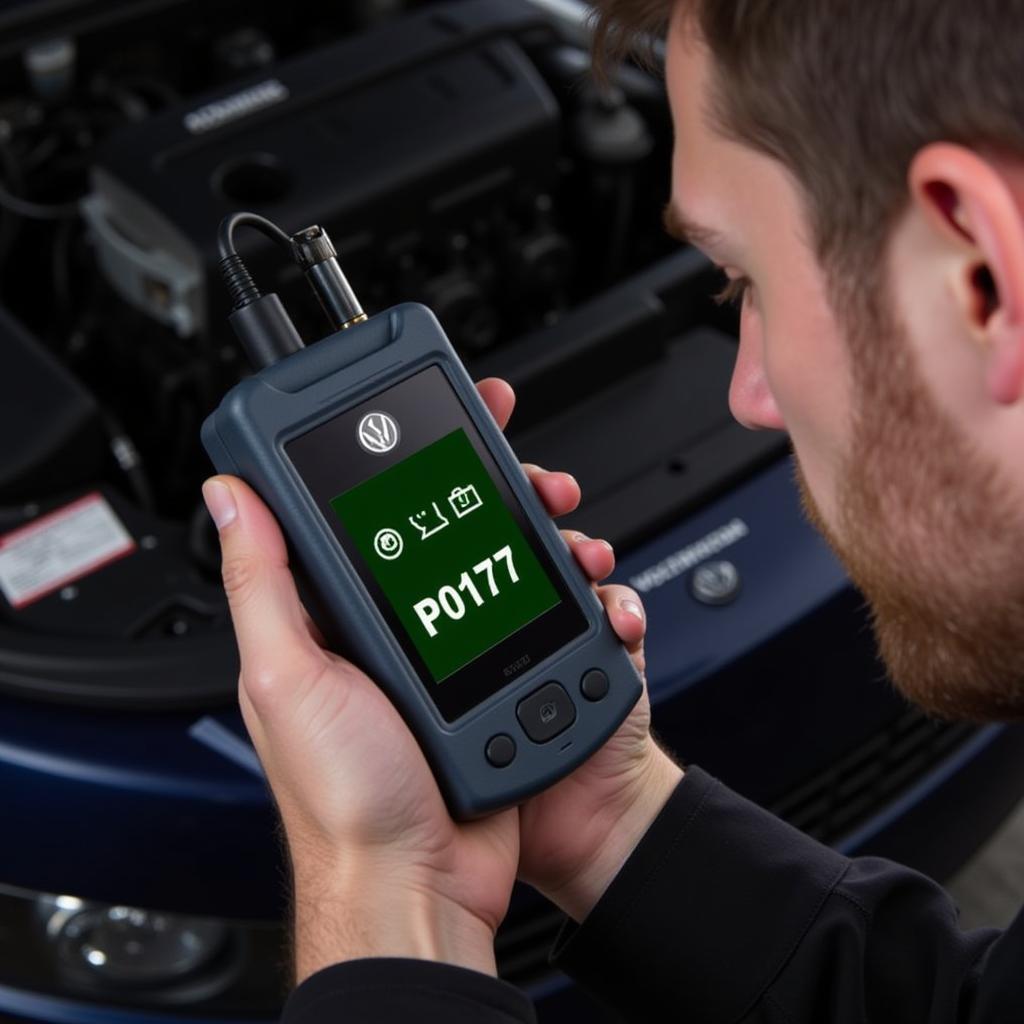Your cart is currently empty!

Understanding VW and BMW Engine Codes
“VW BMW engine code” is a search term that indicates a vehicle owner is experiencing engine problems and wants to understand what the codes mean. These alphanumeric codes, displayed by the vehicle’s onboard diagnostic system (OBD-II), act like a car’s internal language, signaling specific issues within the engine or emission control system. This article will help you decipher these codes and provide guidance on the next steps.
Decoding the Language of Your Engine: VW and BMW Codes
Both Volkswagen (VW) and BMW utilize standardized engine codes, also known as Diagnostic Trouble Codes (DTCs), to pinpoint malfunctions. These codes are essential for efficient diagnostics and repair.
What Does a VW or BMW Engine Code Look Like?
A typical engine code consists of five characters:
- The first character is a letter: This indicates the system where the fault originates:
- P: Powertrain (engine, transmission, emissions)
- B: Body (airbags, power windows, central locking)
- C: Chassis (ABS, traction control, suspension)
- U: Network & Communication (modules, wiring)
- The second character is a number:
- 0: Standardized code (SAE – Society of Automotive Engineers)
- 1: Manufacturer specific code
- The third character is a number or letter: This signifies the specific system within the broader category (e.g., fuel, ignition, air).
- The last two characters are numbers: They pinpoint the exact nature of the fault within the identified system.
For example, a code P0301 would indicate a misfire detected in cylinder 1.
Why Are Engine Codes Important?
Imagine trying to solve a jigsaw puzzle without knowing what the final picture should look like. That’s essentially what diagnosing a car problem is like without engine codes. These codes provide a starting point, narrowing down the potential causes of the issue and saving you time and money on unnecessary repairs.
 Mechanic using an engine code reader on a VW engine
Mechanic using an engine code reader on a VW engine
Common VW and BMW Engine Codes and Their Meanings
While a comprehensive list of all VW and BMW engine codes would be extensive, here are some of the most frequently encountered ones:
VW Engine Codes:
- P0171: System Too Lean (Bank 1) – This code typically indicates an issue with the air/fuel mixture, suggesting too much air or not enough fuel.
- P0420: Catalyst System Efficiency Below Threshold (Bank 1) – This points towards a problem with the catalytic converter, often due to a failing oxygen sensor or a rich fuel mixture.
- P0300: Random/Multiple Cylinder Misfire Detected – This indicates that one or more cylinders are not firing correctly, leading to engine performance issues.
BMW Engine Codes:
- P0101: Mass Air Flow (MAF) Circuit Range/Performance Problem – This signifies an issue with the mass airflow sensor, which measures the amount of air entering the engine.
- P0301: Cylinder 1 Misfire Detected – This indicates a misfire in cylinder 1, potentially caused by spark plugs, ignition coils, or fuel injectors.
- P0440: Evaporative Emission Control System Malfunction – This code points to a problem within the EVAP system, responsible for capturing fuel vapors from the fuel tank.
 Mechanic inspecting a VW engine bay
Mechanic inspecting a VW engine bay
What To Do When Your VW or BMW Throws an Engine Code?
- Don’t Panic: Seeing an engine light can be alarming, but it doesn’t always signify a catastrophic issue.
- Note the Code: Use an OBD-II scanner (available at most auto parts stores) to retrieve the exact code. Write it down!
- Research the Code: Use online resources or a repair manual specific to your VW or BMW model to understand the code’s meaning.
- Check for Obvious Issues: Inspect for loose connections, damaged hoses, or anything visibly amiss under the hood.
- Seek Professional Help: Unless you are comfortable with automotive diagnostics and repair, it is best to consult a qualified mechanic.
“Ignoring engine codes can lead to more severe problems down the line. It’s always best to address them promptly to prevent potential damage to your vehicle.” – John Miller, Senior Automotive Technician at VCDSTool
Using Engine Codes to Prevent Future Problems
Engine codes aren’t just about fixing existing problems; they can also help you prevent future ones. Regularly checking for codes, even without a check engine light, allows you to identify minor issues before they escalate into major headaches.
“Think of engine codes as early warning signs. Addressing them promptly can save you from costly repairs and keep your car running smoothly for years to come.” – Sarah Chen, Lead Diagnostic Technician at VCDSTool
Conclusion
Understanding VW and BMW engine codes empowers you to be a more informed car owner. While you don’t need to be a mechanic, knowing how to decipher these codes can save you time, money, and unnecessary worry. Remember, early detection and diagnosis are key to keeping your VW or BMW performing at its best.
If you need assistance interpreting engine codes or require professional diagnostics and repair, contact VCDSTool at +1 (641) 206-8880 and our email address: vcdstool@gmail.com or visit our office located at 6719 W 70th Ave, Arvada, CO 80003, USA. Our team of expert technicians is here to help.
by
Tags:
Leave a Reply